
Home

Meditation master from Meetirigala Nissarana Vanaya, Sri Lanka
Venerable Uda Eriyagama Dhammajiva has practised as a meditation master for over a decade and is meditation teacher, Abbot and Chief Preceptor of Meetirigala (Mitirigala), a monastery in the strict forest tradition in Sri Lanka. He trained under Ven. Matara Sri Gnanarama Mahathera (Sri Lanka) and Sayadaw U. Panditabhivamsa (Burma).
Latest Books (2019):
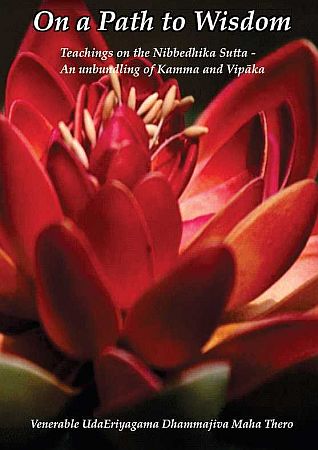
In these lucid and penetrative teachings, Most Venerable Dhammajiva Maha Thero clarifies the Buddha’s teachings on Kamma. The talks explain how intention is kamma - with intention one is responsible for kamma by body, speech and mind; the most proximate cause for kamma is contact and how kamma results can give effect here and now, in this lifetime or after death. With clear instructions, Venerable Maha Thero provides the necessary tools and aids to help a yogi steeped in their pursuit of liberation to discern with penetration, the profound and complex topic of kamma and vipaka.

The talks evoke compassion in those in lay life, striving to assimilate the satipatthana meditation practice amidst household obligations and chores. Filled with practical hints and instructions, the teachings bring to life the four spiritual bases (cattaro iddhipada commonly referred to as satara iddhipada) and aim to map a pathway for those striving towards insight.
Earlier Books:
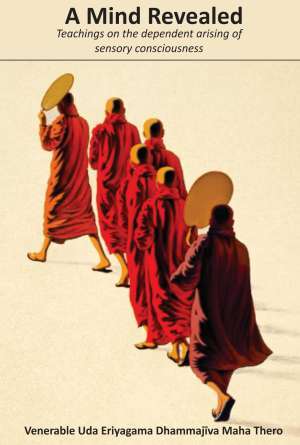
Ven. Dhammajiva's exposition of the Dutiyadvayam Sutta; a practical analysis of sensory consciousness, its causality, operation and cessation.
"You can draw an analogy between the operation of consciousness and the performance of a stage play. When you watch a stage play, with the light moving across the stage, you are taken to its different parts. When the light is projected on the separate roles in sequence, you know which part of the script is being performed. To know which part is being shown, however, you must pay attention and watch it continuously for a little while and follow the light. Then you recognise the actors and the sequence of actions that unfold. Similarly, when the light of mindfulness is projected on the performance of sensory consciousness, occurring in each of the six sense faculties, you can see which aspect of the performance (whether ear-consciousness or eye-consciousness (being the main actor)) is in operation. It may be the eye-consciousness seeing a visual object, or the ear listening to some music, or the nose experiencing a scent. When you mindfully become aware of sensory consciousness, you can note which part of the script is being performed and observe the theatre in the performance of your 'consciousness'!"
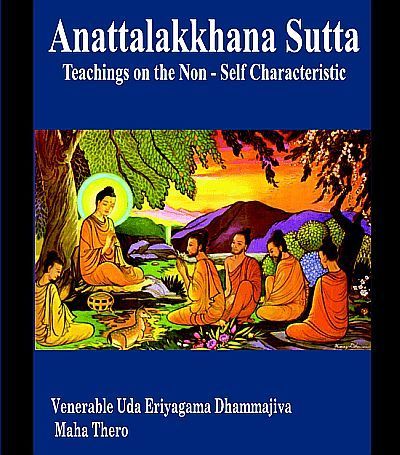
"Form is not-self. Were form self, then this form would not lead to affliction, and one could say of form: 'Let my form be thus, let my form be not thus.' And since form is not- self, so it leads to affliction, and none can command of form: 'Let my form be thus, let my form be not thus."
These teachings are a compilation of talks on the Non-Self Characteristic - one of the 3 characteristics of existence - given by Venerable U Dhammajiva Maha Thero at an International Yogi Retreat at the Mitirigala Nissarana Vanaya Meditation Centre in July 2012.

This teaching captures the essence of Acchanti Sutta, a short discourse from the Devatasamyutta of the Samyutta Nikaya. Although short in length, the sutta imparts an invaluable message and a call for urgency, recollecting the fleeting nature of this rare human birth and the importance of maximising the opportunity available.
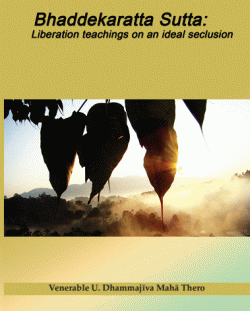
In the practice of insight meditation, the Buddha instructs that the mind ought to remain in the present moment, not wander after the future or to hanker after the past. The past and the future are two extremes. Although we plan, nothing eventuates according to our designs as it is anatta- nonself, which is not subject to governance. Dwelling in the past, we are met with disappointment. The present is the middle path. Retaining the mind in the present moment, we commence the practice of meditation and enter the noble eightfold path. The solitude of the bhaddekaratta is to keep the mind secluded in the presently arising moment for each of the five aggregates: materiality, feelings, perception, mental formations and consciousness.
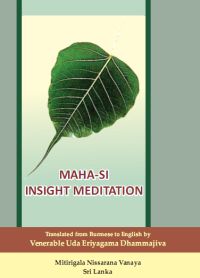
(The first and second volumes of a forthcoming four volume edition)
Teachings of the great Burmese meditation master Mahasi Sayadaw in a new English translation by Ven. Dhammajiva.
"Insight meditation (vipassana) is the core of the Buddha's exhortation as it is the basis upon which one realizes mind and matter (nama-rupa); the triple characteristics of impermanence, unsatisfactoriness and selflessness (anicca, dukkha, anatta); and the four noble truths (ariya sacca) with one’s own personal understanding or wisdom. When one is negligent of insight meditation, once becomes negligent of the Buddha’s noble message in toto."
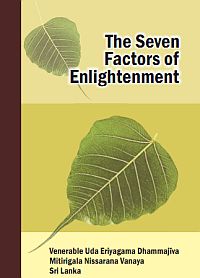
This book contains the essence of the Buddha's teachings on the Seven Factors of Awakening.
"In a rare exposition on the Bojjhanga Dhamma, Venerable U. Dhammajiva offers an uncompromising and intuitive clarification of their unfolding and instructs how the seven factors of awakening align to give fruition to a yogi's spiritual quest. Traditionally, Sri Lankan culture associates the chanting of the Bojjhanga Sutta as a panacea for any ailment, malaise or adversity. For many, the power of the sutta exposition has a healing effect. In this book, Venerable Dhammajiva's exposition transcends the conventional sphere to heal the suffering that the Satipatthana meditation practice offers. It maps the specific points of the journey and the experiences that a yogi could expect when each of the seven factors of awakening unfold and reciprocally support one another for the attainment of path and fruition consciousness."
We are happy to be able to present the following meditation texts drawn from teachings Ven. Dhammajiva gave in Australia in 2006 and 2007.

Practical and accessible discourses translated from Sinhala to English concerning the Anapanasati Sutta and the practice of mindfulness.
"A yogi who is inclined towards concentration meditation will enter deep concentration during meditation and sit still for a long time without the slightest inclination to move the body. A samatha yogi can remain in the state of 'one-pointedness' and durable concentration. A vipassana yogi (who is inclined towards insight) will experience momentary concentration and observe the beginning, middle and end of the breath as well as the bodily pains that arise. A vipassana yogi is able to discern and note all phenomena as soon as they arise. With vipassana samadhi, each object is noted with momentary concentration."
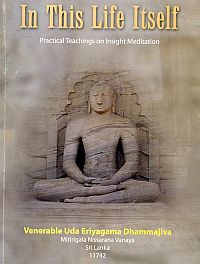
Clear teachings on the practice of Satipatthana and Insight Meditation (vipassana).
"Mindfulness is the process of bringing one's mind to the present moment. When we try to bring our mind to the present moment, we observe its true nature - how it habitually wanders around, day-dreams and fantasizes. We are always preoccupied with the past and the future. The mind is rarely in the present. It is like a mad monkey that jumps from one branch to another. It is swift and jumps around. It is always in a state of flux. It is impossible to observe the mind's true nature, unless we pause with mindfulness."
The following book is drawn from Ven. Dhammajiva's talks to the resident monks and yogis at his centre in Sri Lanka:

Ven. Dhammajiva's exposition of the Dutiyadvayam Sutta; a practical analysis of sensory consciousness, its causality, operation and cessation.
"You can draw an analogy between the operation of consciousness and the performance of a stage play. When you watch a stage play, with the light moving across the stage, you are taken to its different parts. When the light is projected on the separate roles in sequence, you know which part of the script is being performed. To know which part is being shown, however, you must pay attention and watch it continuously for a little while and follow the light. Then you recognise the actors and the sequence of actions that unfold. Similarly, when the light of mindfulness is projected on the performance of sensory consciousness, occurring in each of the six sense faculties, you can see which aspect of the performance (whether ear-consciousness or eye-consciousness (being the main actor)) is in operation. It may be the eye-consciousness seeing a visual object, or the ear listening to some music, or the nose experiencing a scent. When you mindfully become aware of sensory consciousness, you can note which part of the script is being performed and observe the theatre in the performance of your 'consciousness'!"
Dhamma Essay:
Tolerance and Diversity by Bhikkhu Bodhi
Meditation |
Resources |
Pali Canon |
Training |
Parisa
Links |
Books |
Newsletter |
Feedback |
Donate
to know - to shape - to liberate
Site Copyright © 2024, Vipassana Fellowship and Course Publishing Ltd [Terms of Service & Privacy Policy]